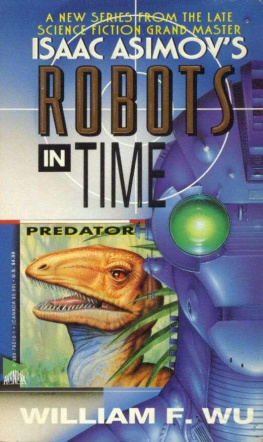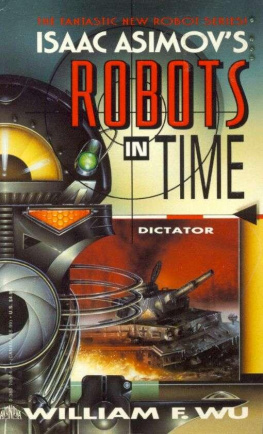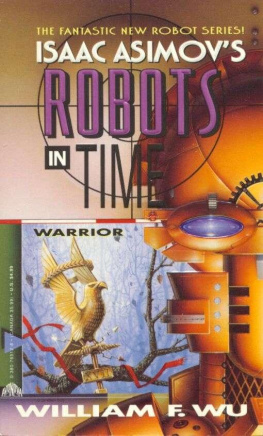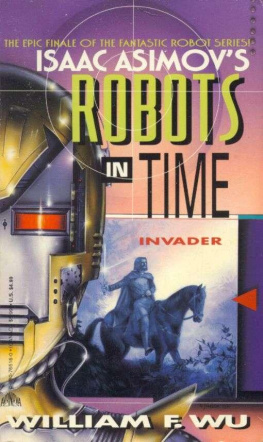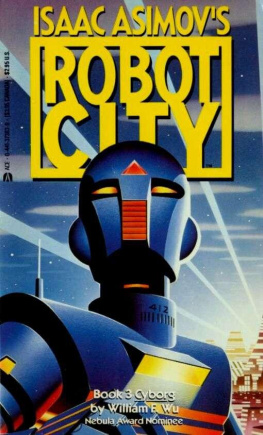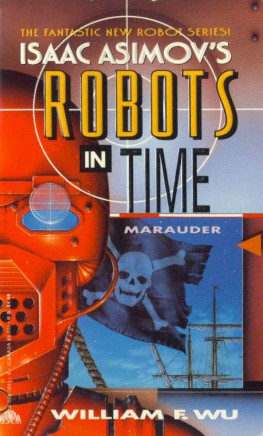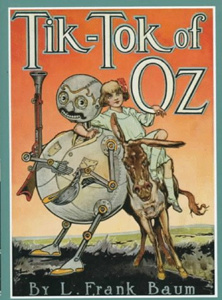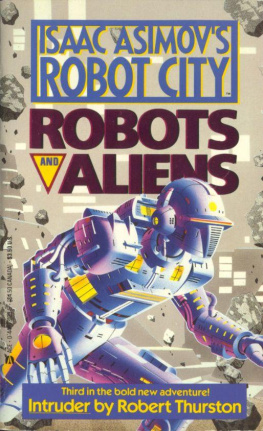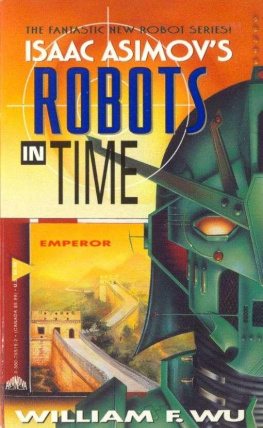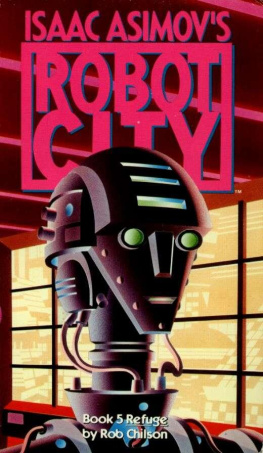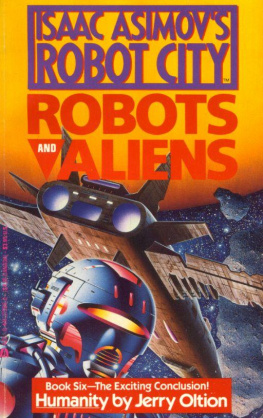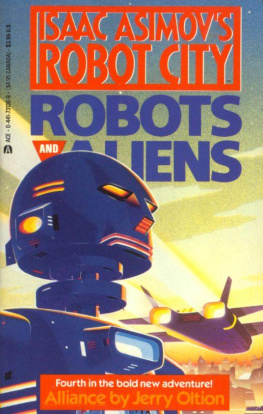William F. Wu - Predator (Isaac Asimovs Robots in Time)
Here you can read online William F. Wu - Predator (Isaac Asimovs Robots in Time) full text of the book (entire story) in english for free. Download pdf and epub, get meaning, cover and reviews about this ebook. year: 1993, publisher: Avon Books (Mm), genre: Detective and thriller. Description of the work, (preface) as well as reviews are available. Best literature library LitArk.com created for fans of good reading and offers a wide selection of genres:
Romance novel
Science fiction
Adventure
Detective
Science
History
Home and family
Prose
Art
Politics
Computer
Non-fiction
Religion
Business
Children
Humor
Choose a favorite category and find really read worthwhile books. Enjoy immersion in the world of imagination, feel the emotions of the characters or learn something new for yourself, make an fascinating discovery.
- Book:Predator (Isaac Asimovs Robots in Time)
- Author:
- Publisher:Avon Books (Mm)
- Genre:
- Year:1993
- Rating:4 / 5
- Favourites:Add to favourites
- Your mark:
- 80
- 1
- 2
- 3
- 4
- 5
Predator (Isaac Asimovs Robots in Time): summary, description and annotation
We offer to read an annotation, description, summary or preface (depends on what the author of the book "Predator (Isaac Asimovs Robots in Time)" wrote himself). If you haven't found the necessary information about the book — write in the comments, we will try to find it.
Predator (Isaac Asimovs Robots in Time) — read online for free the complete book (whole text) full work
Below is the text of the book, divided by pages. System saving the place of the last page read, allows you to conveniently read the book "Predator (Isaac Asimovs Robots in Time)" online for free, without having to search again every time where you left off. Put a bookmark, and you can go to the page where you finished reading at any time.
Font size:
Interval:
Bookmark:
Predator - Isaac Asimov's Robots In Time, vol 1 - by William F. Wu
ISAAC ASIMOVS
ROBOTS IN TIME
PREDATOR
WILLIAM F. WU
Copyright 1993
This novel is dedicated to
Bill Moss,
in memory of all those colorful plastic dinosaurs
we used to play with,
and of our formative years together.
Special thanks are due for help in writing this novel to Michael D. Toman, as usual, for invaluable research aid; Dr. William Q. Wu, and Cecile F. Wu, my parents, for indulging my childhood interest in dinosaurs; Ricia Mainhardt; John Betancourt; and Byron Preiss.
THE LAWS OF ROBOTICS
A robot may not injure a human being, or through inaction, allow a human being to come to harm.
A robot must obey the orders given it by human beings except where such orders would conflict with the First Law.
A robot must protect its own existence as long as such protection does not conflict with the First or Second Law
Foreward
In Robot Visions, Dr. Isaac Asimov writes about a question inherent in any time travel storywhether individuals traveling in time will alter events that would have occurred without the interference of a time traveler. Most writers who tackle this question write about changing the past and whether doing so is desirable or not. The Good Doctor, once again exhibiting the originality of his own vision, chooses to focus on a more rarely examined concern: of traveling into the future, and the possible consequences of doing so.
Stories that merely take place in the future are not the same as stories about individuals who travel from their own time, whatever it is, to their future. To my knowledge, the first science fiction novel to tell such a story is the classic novel by H. G. Wells, The Time Machine. In it Wells writes of a man who travels to the distant future from VictorianEngland, the time and place in which Wells was writing the novel. However, Wells presented a dystopian vision of the future as a warning of what could happen if the rigid social and economic divisions of his own society worsened to the extreme. The possibility of avoiding that vision lay not with the time traveler, but with the people who lived in Wellss time. Wells did not really examine whether his time travelers report to his friends back in his own time would bring about a different future.
Two theories of history influence the tale any writer tells about time travel. One belief is that only large forces such as technological advance, economic change, and the development of religions and philosophies determine the direction of history. The other theory is that any event, no matter how small, sends out ripples of influence that profoundly affect all other events. An historian told me that his colleagues are about evenly divided in their support of these theories. Authors of time travel stories always write with one or the other implicit, if not explicit, in their work.
I first discovered the science fiction of Isaac Asimov as a child and have read both his fiction and nonfiction in the years since then. Writing time travel stories about his positronic robots and his Three Laws of Robotics is therefore a special honor for me, and I hope you will enjoy the Robots in Time series. By way of introduction, this book presents the late Dr. Asimovs fantastic Robot Visions.
William F. Wu.
Mojave Center Governor sat in his office, deep in the underground city ofMojave Center. He was an experimental humaniform robot of a type that was new this year, 2140. Each of the Governor robots was currently running all the municipal systems of one entire, newly-constructed city. They were doing so under probationary status, monitored by a committee of scientists through their computer.
His office was in the middle level of the city, in the center of that level. He didnt really need an office at all since most of his work was done through his radio link to the city computer or directly to municipal departments; further, he could plug into various terminals when necessary. However, he had learned that humans sometimes preferred doing business in an office, so he maintained a small room inMojaveCenterfor that purpose.
At the moment, MC Governor was alone. He plugged his humaniform forefinger into a wall jack. Inside the jack, the end of his finger opened and plugged into the system. He contacted the city computer.
I am going to run a simulation program again, said MC Governor. I will continue my normal duties through my multi-tasking system. However, I instruct you not to transfer any communication or other interruption lower than Priority 5. When I have finished running the simulation, I will notify you.
Acknowledged, said the city computer.
MC Governor returned his finger to human shape, breaking the shielded connection. For the sake of security, he told himself, he chose not to use radio communication concerning the simulation programs. Lately he had been running them more often than before.
He ran down his list of programs. They were standard simulation programs that all the Governors used to discover and correct potential problems and challenges without actually having to face them in real life. His favorites involved some sort of disaster that befellMojaveCenter, requiring him to respond urgently under the Laws of Robotics to restore the situation to normal. Like all positronic robots, he was programmed so that his greatest imperative, and his greatest reward, was in obeying the Laws. The First Law of Robotics was, A robot may not injure a human being, or, through inaction, allow a human being to come to harm.
This time, he selected the program called Desert Flash Flood. It was essentially a form of role-playing game. He began running it. Suddenly he found himself standing in the main thoroughfare ofMojaveCenter,
Antelope Valley Boulevard , with water a meter high pouring down the street.MC Governor was a very tall, brawny robot. He ran through the water to a young woman who was stumbling and splashing helplessly, trying to hold a toddler in her arms. As MC Governor picked her up and strode through the current toward an escalator, he radioed the city monitors who controlled all the basic life functions.
Shut down all electricity to nonessential services if they have failed to shut down automatically, he instructed the computer, as he carried the woman and her child. Run a status check on the emergency electrical systems providing essential services.
Right now, his greatest worry was the electrocution of humans if broken power lines touched the flood water. As a Governor robot, he was a central control unit, capable of managing entire cities, from traffic to essential services and utilities, to environmental control and industry. The city had its own decentralized computer systems, which reported directly to him and took his instructions by way of his internal radio and video systems.
Thank you, the woman gasped, clutching her drenched toddler as MC Governor set her down on the rising escalator.
Almost immediately, the monitors reported that nonessential services were being discontinued. The escalator stopped moving, but the woman stumbled on up the steps. MC Governor waded back into the water toward a trolley full of humans stranded on one side of the boulevard. They were yelling and screaming in panic. Its robot driver was speaking calmly to his passengers, asking for patience.
The city monitors reported that the emergency power system was functioning safely.
Next pageFont size:
Interval:
Bookmark:
Similar books «Predator (Isaac Asimovs Robots in Time)»
Look at similar books to Predator (Isaac Asimovs Robots in Time). We have selected literature similar in name and meaning in the hope of providing readers with more options to find new, interesting, not yet read works.
Discussion, reviews of the book Predator (Isaac Asimovs Robots in Time) and just readers' own opinions. Leave your comments, write what you think about the work, its meaning or the main characters. Specify what exactly you liked and what you didn't like, and why you think so.

